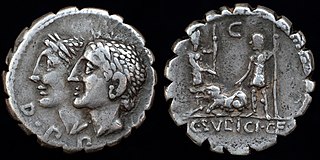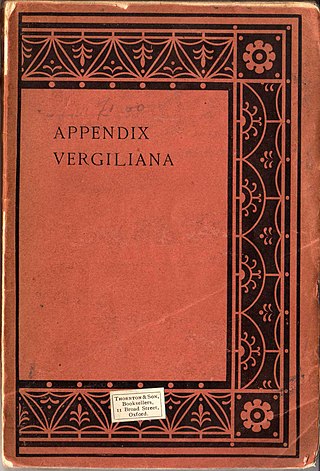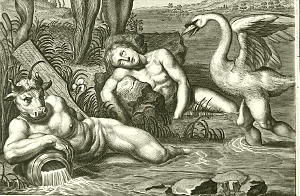Latin literature includes the essays, histories, poems, plays, and other writings written in the Latin language. The beginning of formal Latin literature dates to 240 BC, when the first stage play in Latin was performed in Rome. Latin literature would flourish for the next six centuries. The classical era of Latin literature can be roughly divided into the following periods: Early Latin literature, The Golden Age, The Imperial Period and Late Antiquity.

Publius Vergilius Maro, usually called Virgil or Vergil in English, was an ancient Roman poet of the Augustan period. He composed three of the most famous poems in Latin literature: the Eclogues, the Georgics, and the epic Aeneid. A number of minor poems, collected in the Appendix Vergiliana, were attributed to him in ancient times, but modern scholars consider his authorship of these poems to be dubious.

The 1st century BC, also known as the last century BC and the last century BCE, started on the first day of 100 BC and ended on the last day of 1 BC. The AD/BC notation does not use a year zero; however, astronomical year numbering does use a zero, as well as a minus sign, so "2 BC" is equal to "year –1". 1st century AD follows.

In ancient Roman religion, the Di Penates or Penates were among the dii familiares, or household deities, invoked most often in domestic rituals. When the family had a meal, they threw a bit into the fire on the hearth for the Penates. They were thus associated with Vesta, the Lares, and the Genius of the pater familias in the "little universe" of the domus.

Classical Latin is the form of Literary Latin recognized as a literary standard by writers of the late Roman Republic and early Roman Empire. It was used from 75 BC to the 3rd century AD, when it developed into Late Latin. In some later periods, it was regarded as good or proper Latin, with following versions viewed as debased, degenerate, or corrupted. The word Latin is now understood by default to mean "Classical Latin"; for example, modern Latin textbooks almost exclusively teach Classical Latin.
Gaius Memmius was a Roman politician, orator and poet. He is most famous as the dedicatee of Lucretius' De Rerum Natura, and for his appearances in the poetry of Catullus.
Gaius Helvius Cinna was an influential neoteric poet of the late Roman Republic, a little older than the generation of Catullus and Calvus. He was lynched at the funeral of Julius Caesar after being mistaken for an unrelated Cornelius Cinna who had spoken out in support of the dictator's assassins.

The Eclogues, also called the Bucolics, is the first of the three major works of the Latin poet Virgil.

The Appendix Vergiliana is a collection of Latin poems traditionally ascribed as being the juvenilia of Virgil.
The Neoterikoi or Neoterics were a series of avant-garde Latin poets who wrote in the 1st century BCE. Neoteric poets deliberately turned away from classical Homeric epic poetry. Rather than focusing on the feats of ancient heroes and gods, they propagated a new style of poetry through stories that operated on a smaller scale in regard to themes and setting.
Siro was an Epicurean philosopher who lived in Naples.

In Latin, invidia is the sense of envy, a "looking upon" associated with the evil eye, from invidere, "to look against, to look in a hostile manner." Invidia ("Envy") is one of the Seven Deadly Sins in Christian belief.

Augustan literature refers to the pieces of Latin literature that were written during the reign of Caesar Augustus, the first Roman emperor. In literary histories of the first part of the 20th century and earlier, Augustan literature was regarded along with that of the Late Republic as constituting the Golden Age of Latin literature, a period of stylistic classicism.

Eclogue4, also known as the FourthEclogue, is a Latin poem by the Roman poet Virgil. The poem is dated to 40 BC by its mention of the consulship of Virgil's patron Gaius Asinius Pollio.

In Greek mythology, Cycnus or Cygnus, was a king of Liguria, a beloved and kin of Phaethon, who lamented his death and was subsequently turned into a swan and then a constellation.
The poem Dirae is one of the poems that make up the Appendix Vergiliana. It is a pastoral poem, told from the perspective of a Sicilian herdsman forced to give up his land to Lycurgus, who is receiving this land as a reward for his participation in the Roman civil wars. The herdsman spends the entire poem cursing the land so Lycurgus cannot benefit from it.

Eclogue 3 is a pastoral poem by the Latin poet Virgil, one of a collection of ten poems known as the "Eclogues". This eclogue represents the rivalry in song of two herdsmen, Menalcas and Damoetas. After trading insults, the two men decide to have a singing competition, for which each offers a prize. A neighbour, Palaemon, who comes along by chance, agrees to be the judge. The second half of the poem consists of the contest, in which each of the two competitors in turn sings a couplet and the other caps it with another couplet. In the end Palaemon brings the contest to an end and declares it a draw.
Eclogue 7 is a poem by the Latin poet Virgil, one of his book of ten pastoral poems known as the Eclogues. It is an amoebaean poem in which a herdsman Meliboeus recounts a contest between the shepherd Thyrsis and the goatherd Corydon.

Eclogue 9 is a pastoral poem by the Latin poet Virgil, one of his series of ten poems known as the Eclogues. This eclogue describes the meeting of two countrymen Lycidas and Moeris. Moeris has been turned out of his farm and is taking some kid goats to town for the new occupant; young Lycidas is astonished, for he had heard that Menalcas had secured the safety of the district by his poetry, but Moeris replies that, so far from that being so, he and Menalcas himself had barely escaped with their lives: they then proceed to recall passages of Menalcas' poetry. Lycidas wants to continue singing to lighten the journey but the distressed Moeris begs him to cease, promising that they will sing again when Menalcas returns.